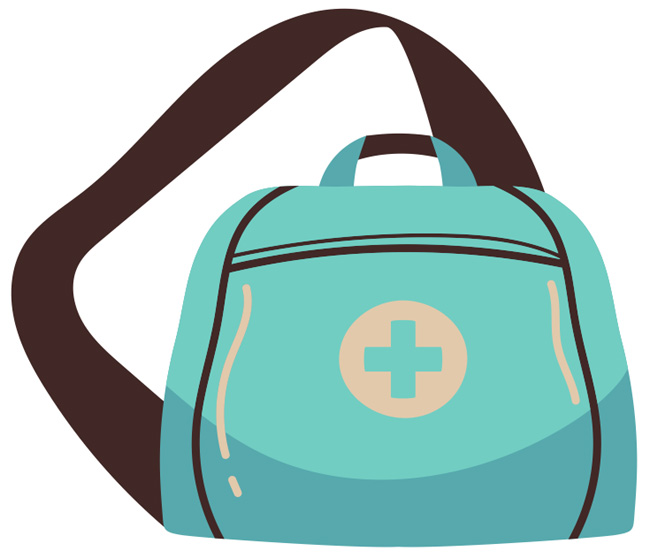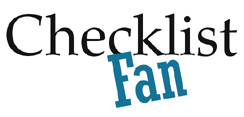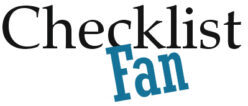
To avoid the stress and hassle of a planned hospital stay or emergency, it makes sense to pack a hospital bag in advance. With a hospital bag, all of your personal items, clothing, and important documents are right at your fingertips.
A checklist makes it easy for you to think of everything important – step by step, without forgetting anything. In this article, you will find a clear and practical overview to help you pack your hospital bag quickly and effectively. Let’s get started – for more comfort and peace of mind during your hospital stay!
Suggested use of the checklist
- To get an overview of the contents of a hospital bag, I recommend that you go through the checklist in its entirety. You can skip items that are not relevant to you. Check to see if you have everything you need for your hospital bag or if you need to buy anything else.
- The checklist is numbered sequentially. If you are pressed for time and cannot complete the checklist all at once, write down the last number and continue later.
Checklist:
Hospital bag
| Documents for admission |
| 1. Health insurance card/electronic health card from insurance company – Required to ensure insurance coverage and to register your information at the hospital. |
| 2. Identity card – Used for identity verification, especially during admission and discharge procedures. |
| 3. Hospital referral from primary care physician or specialist, or treatment guarantee for private patients – A medical referral or insurance authorization is required to arrange admission and treatment. |
| 4. Medical Report – Contains important medical information and diagnoses relevant to your hospital care. |
| 5. Test results (X-rays, ECG, blood test results) from primary care physician or previous hospitalizations – Helps doctors diagnose and treat you quickly by taking into account previous tests. |
| 6. X-ray record – Documents previous X-rays to avoid unnecessary radiation exposure. |
| 7. Patient card – Provides proof of chronic conditions or specific medical treatments. |
| 8. Implant card – Provides information about implants that need to be considered during medical procedures. |
| 9. Anticoagulation card (marcumar card) – Required for patients taking blood-thinning medications as it may affect treatment strategies. |
| 10. Diabetes card – Informs hospital staff about your diabetes to ensure proper care. |
| 11. Immunization record – Documents your immunization status, which may be important for certain medical evaluations or preventive measures. |
| 12. Allergy card – Prevents allergic reactions by identifying known allergies. |
| 13. Advance healthcare directive and power of attorney – Provides for medical decisions and authorizations in the event you are unable to make them. |
| 14. Emergency card – Contains vital medical information such as blood type and pre-existing conditions. |
| 15. Copayment exemption certificate or proof of hospital daily cash insurance – Confirms copayment waivers or additional benefits covered. |
| 16. Organ donor card – Documents your consent to be an organ donor, which can be vital in an emergency. |
| For your stay |
| 17. Current medications and a list of dosages – Ensures that you continue to take your medications and informs hospital staff of ongoing therapies. |
| 18. Comfortable clothing (sweatpants, light jacket, sweater) – Provides comfort during your hospital stay. |
| 19. Bathrobe, swimsuit, bath shoes – Useful for bathing, spa areas, or aquatic therapy. |
| 20. Underwear – For daily changes and personal hygiene. |
| 21. Sleepwear (pajamas, nightgown) – Essential for restful nights in the hospital. |
| 22. Socks, stockings, compression stockings – Keep your feet warm and help prevent circulation problems. |
| 23. Slippers (non-slip and easy to put on) – Slippers that are non-slip and easy to wear increase safety and comfort. |
| 24. Sturdy shoes, athletic shoes for physical therapy – Necessary for mobility training and exercise therapy. |
| 25. Towels, washcloths – For personal hygiene and daily cleaning. |
| 26. Hair Dryer – Convenient for drying hair after washing. |
| 27. Personal care items (shower gel, shampoo, soap, deodorant, toothbrush, toothpaste, etc.) – Maintain your regular skin care routine and feel clean and refreshed. |
| 28. Feminine hygiene products – Essential for women to be prepared for any situation. |
| 29. Facial tissues – For daily use. |
| 30. Brush/comb – For hair care. |
| 31. Hand mirror – Handy for grooming. |
| 32. Nail scissors/file – For nail care. |
| 33. Denture case and cleaning tablets – Useful if you wear dentures. |
| 34. Shaving supplies – For shaving and grooming. |
| 35. Eyeglasses and eyeglass case – To protect your eyewear. |
| 36. Contact lenses and cleaning solution – Important if you wear contact lenses. |
| 37. Hearing aid – Important if you have a hearing loss. |
| 38. Cane, walker, wheelchair – If you have mobility issues. |
| 39. Equipment used at home but not available in the hospital (oxygen concentrator, ostomy supplies, tracheostomy supplies, suction, nebulizer, blood glucose monitor, PEG feeding systems, orthopedic pillows) – Make sure you have the supplies you need during your stay. |
| 40. Discharge clothing – Weather-appropriate clothing for the day of discharge. |
| Useful items for your stay |
| 41. Books, Magazines, Tablet – To help pass the time and provide relaxation. |
| 42. Favorite music for distraction and relaxation (phone or MP3 player) – Helps provide distraction and relaxation. |
| 43. Phone to call family, friends, and acquaintances – Keeps you in touch with family and friends. |
| 44. Phone book, notebook, writing utensils, laptop – Useful for taking notes or keeping important numbers handy. |
| 45. Small change, e.g. for a vending machine – Useful for vending machines or small purchases. |
| 46. Sleep Mask – Helps you sleep well even in bright conditions. |
| 47. Earplugs – Reduce noise and help you sleep. |
| Inform before your stay |
| 48. Family and relatives – Let your loved ones know you are in the hospital so they can arrange for support. |
| 49. Employer, unemployment office – Arrange your absence. |
| 50. Doctor, nursing service – Inform your health care team about your hospitalization. |
| 51. Friends and neighbors – Helpful for arranging help with daily tasks, such as mail or pet care. |
_________
That’s all you need for a hospital bag. I hope the checklist was helpful and I would be happy if you visit ChecklistFan.com again.
Your ChecklistFan

More checklists
All checklists on ChecklistFan.com
Note: All information is provided to the best of my knowledge, but I assume no liability and make no claim to completeness or accuracy. I have translated the checklist from my German website ChecklistFan.de. Please note that it describes conditions and requirements specific to Germany, which may differ from your local area or country. Adjustments may be necessary to reflect your local conditions or regulations. Some of the resources I used to create the checklist include: Comfort Keepers, St Vincent´s Health Australia, U.S. News, CareAline. If you have any suggestions for improving the checklist, you can leave a comment or write to me: reiko@checklistfan.com.

